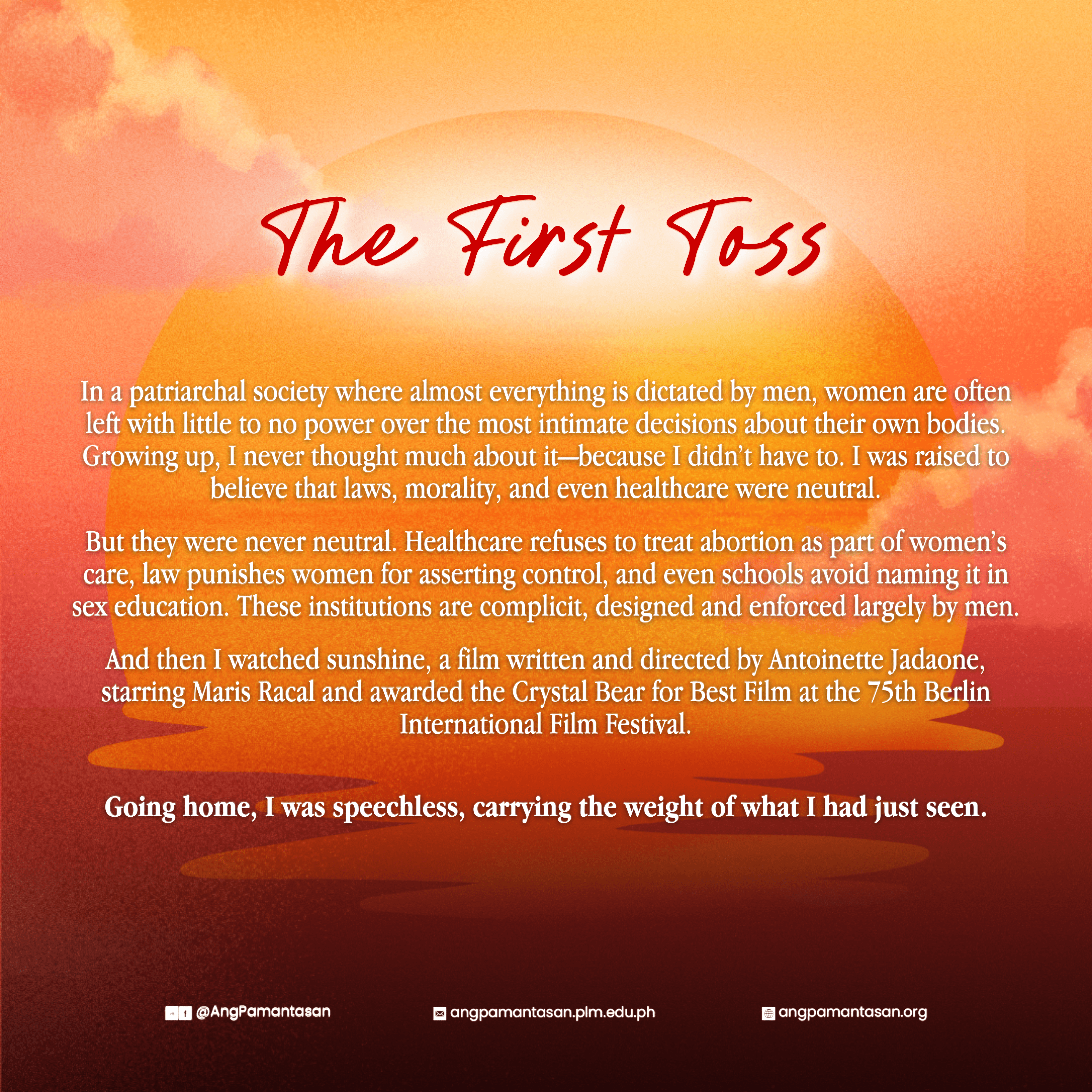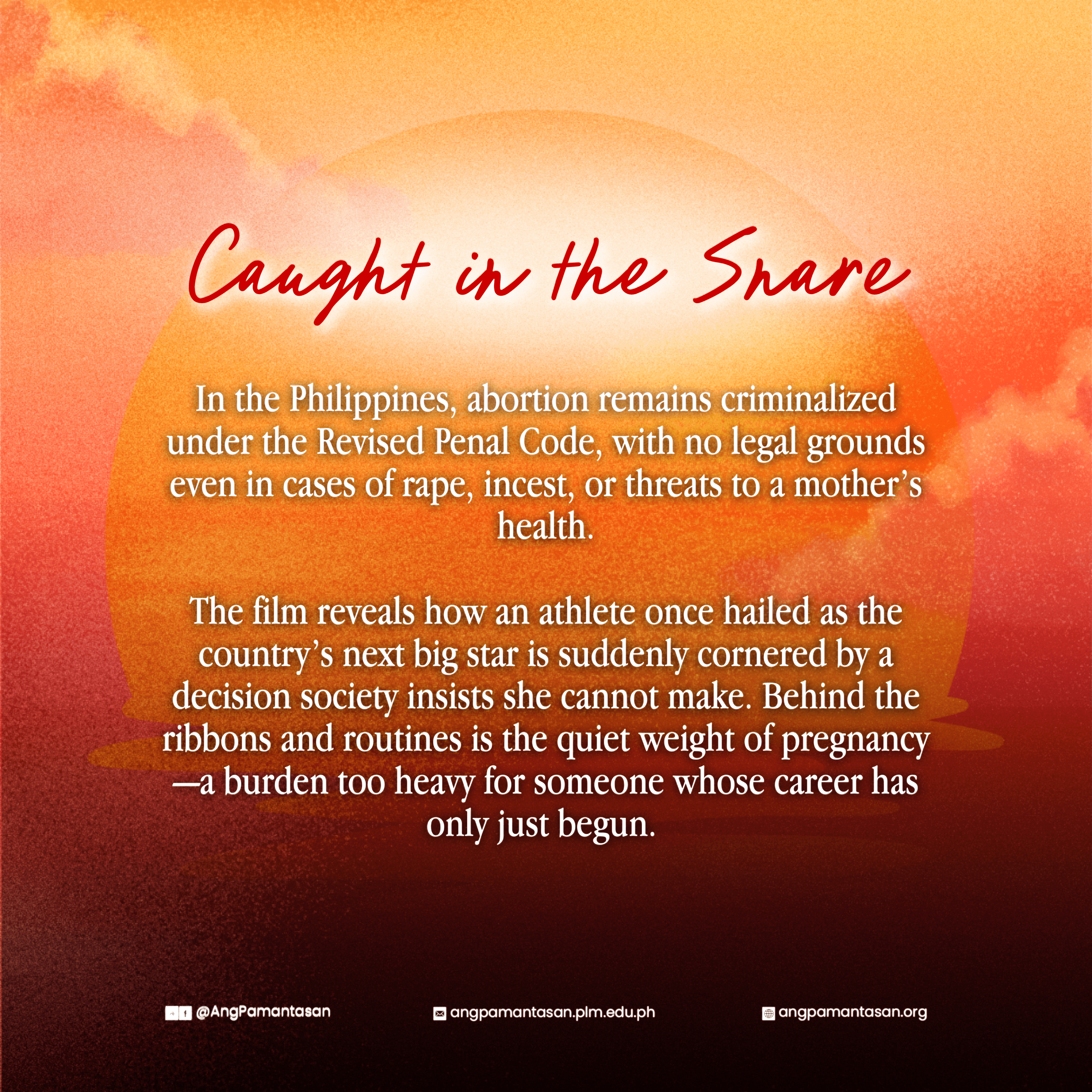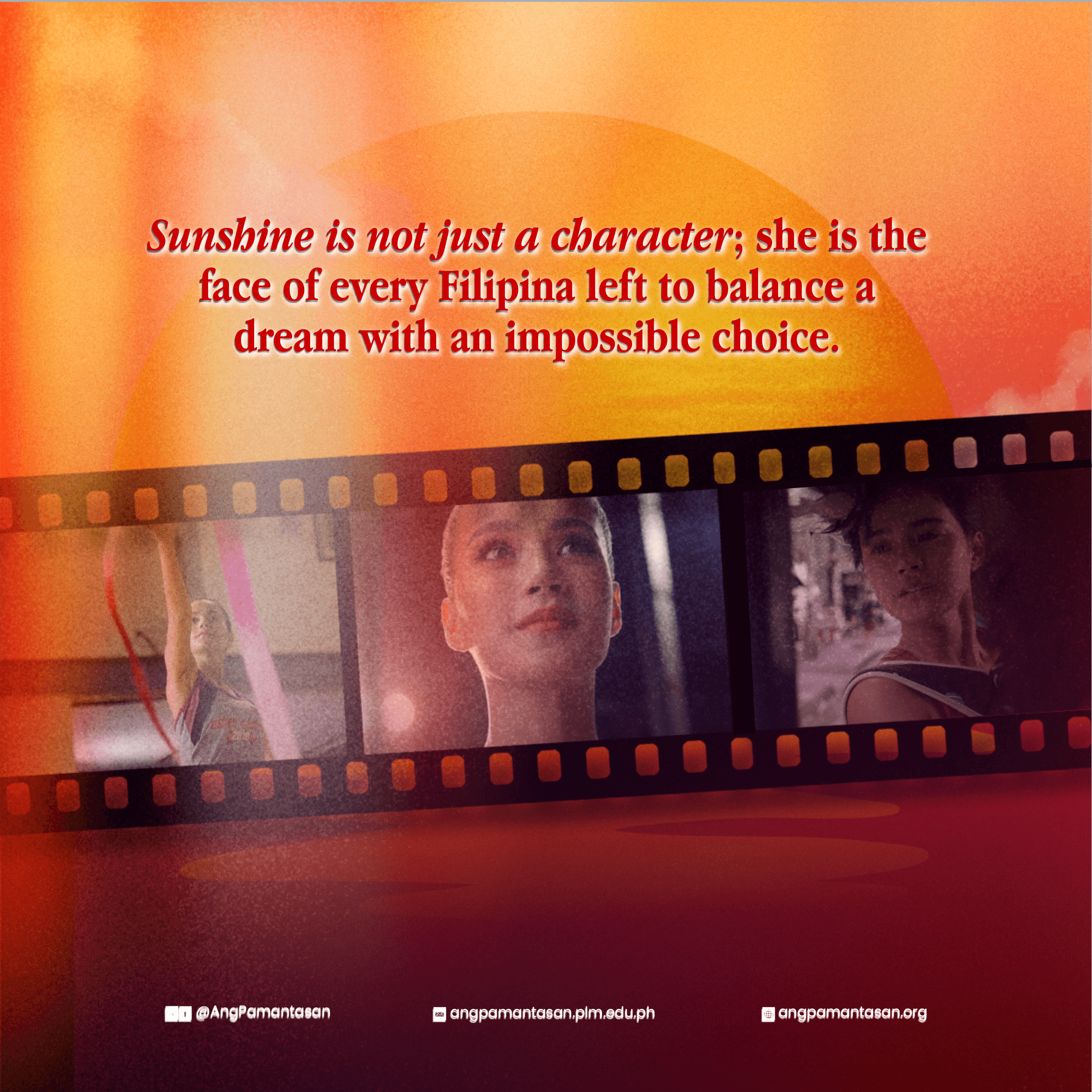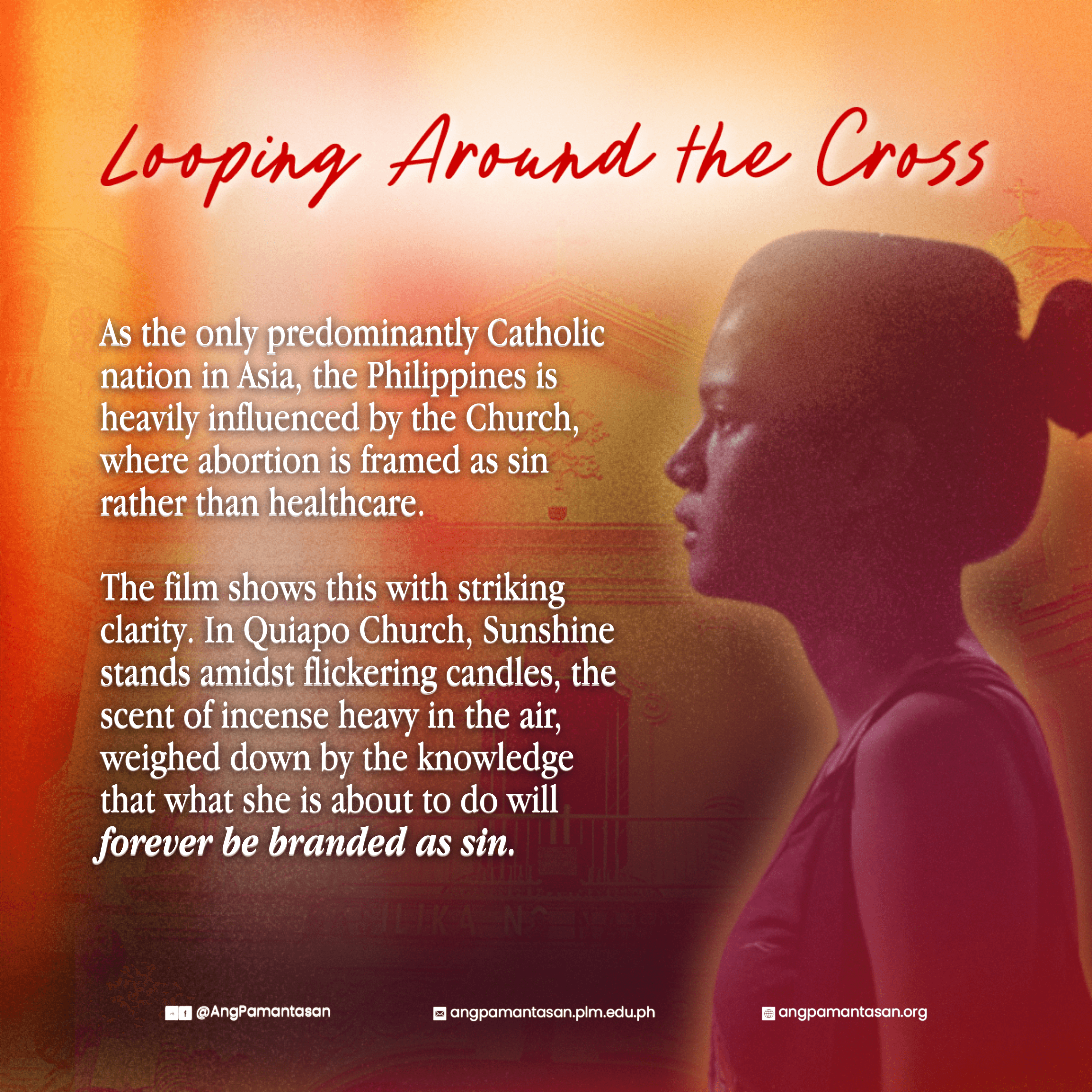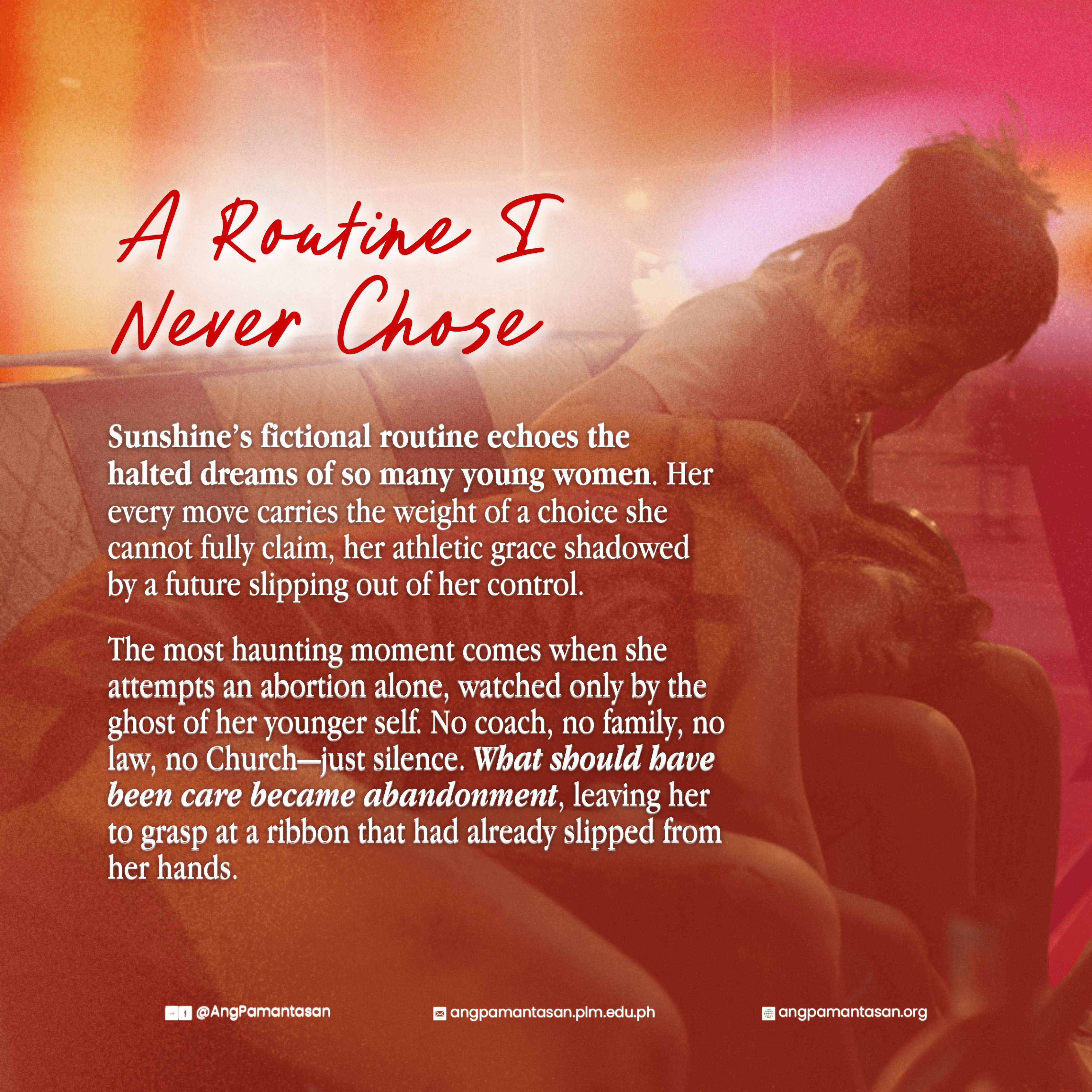When Sunshine Faded to Black, I Finally Muttered “Gets Ko Na”
Written by John Nathaniel Mandap • Boards by Krystal Arianna Puzon | 20 September 25
The First Toss
In a patriarchal society where almost everything is dictated by men, women are often left with little to no power over the most intimate decisions about their own bodies. Growing up, I never thought much about it—because I didn’t have to. I was raised to believe that laws, morality, and even healthcare were neutral.
But they were never neutral. Healthcare refuses to treat abortion as part of women’s care, law punishes women for asserting control, and even schools avoid naming it in sex education. These institutions are complicit, designed and enforced largely by men.
And then I watched Sunshine, a film written and directed by Antoinette Jadaone, starring Maris Racal and awarded the Crystal Bear for Best Film at the 75th Berlin International Film Festival. I remember sitting in the last screening of the night at MOA, expecting the familiar comfort of the cinema I always seek. But by the time the credits rolled, that comfort had been disturbed—in the best, most necessary way. Going home, I was speechless, carrying the weight of what I had just seen.
Spirals of Complicity
The film shook me in ways I did not expect. Abortion, a topic so taboo in Philippine society that it is often silenced in public discourse, was suddenly placed right in front of me. But it wasn’t framed as a distant legal or moral debate—it was humanized.
One image lingers with me: Maris Racal, a gymnast, twirling her ribbon with precision and grace, only for the rhythm to falter as the reality of her situation bore down on her. She moved like an athlete on a wide mat, her body embodying the impossible balancing act between pursuing her dream and carrying the burden of an unwanted pregnancy. Every hesitation was a wobble, every pause a choice she could not fully claim as her own.
The parallel deepens with her ate—a former gymnast who once stood in the same place. Though never spoken outright, her presence revealed the quiet tragedy of dreams once cut short. Unlike society, however, her sister offered no judgment. Instead, she became a soft reminder: you still have a choice, one I never had.
Caught in the Snare
In the Philippines, abortion remains criminalized under the Revised Penal Code, with no legal grounds even in cases of rape, incest, or threats to a mother’s health. This absence of protection doesn’t erase abortion; it only drives it into the shadows, forcing thousands of Filipino women each year into unsafe procedures, many ending in complications or death.
Sunshine makes those statistics flesh. The film reveals how an athlete once hailed as the country’s next big star is suddenly cornered by a decision society insists she cannot make. Behind the ribbons and routines is the quiet weight of pregnancy—a burden too heavy for someone whose career has only just begun.
Sunshine is not just a character; she is the face of every Filipina left to balance a dream with an impossible choice.
Looping Around The Cross
Religion, too, cements this silence. As the only predominantly Catholic nation in Asia, the Philippines is heavily influenced by the Church, where abortion is framed as sin rather than healthcare. Politicians, most of them male, wield that belief as both shield and sword, upholding restrictive laws in the name of morality while disregarding women’s lived struggles.
The film shows this with striking clarity. In Quiapo Church, Sunshine stands amidst flickering candles, the scent of incense heavy in the air, weighed down by the knowledge that what she is about to do will forever be branded as sin.
Her turmoil was not just personal but cultural; her silence echoed the centuries-old dogma whispering at her back. Religion was not only her guide but her jailer, shaping morality into chains.
A Routine I Never Chose
Director Antoinette Jadaone first drafted Sunshine during the pandemic, after reading about the surge in teenage pregnancies. What began as a creative outlet quickly became a reckoning, the story unfolding like a ribbon midair—suspended, fragile, and heavy with meaning.
Sunshine’s fictional routine echoes the halted dreams of so many young women. Her every move carries the weight of a choice she cannot fully claim, her athletic grace shadowed by a future slipping out of her control.
The most haunting moment comes when she attempts an abortion alone, watched only by the ghost of her younger self. No coach, no family, no law, no Church—just silence. What should have been care became abandonment, leaving her to grasp at a ribbon that had already slipped from her hands.
The Drop
I’ll admit, I came into the film expecting just another social commentary. But somewhere in the silence of its most agonizing moments—the kind that presses down like a held breath—I found myself whispering it almost instinctively: “Gets ko na”. I finally understood.
I understood that this was never about control in the hands of men, but about the autonomy women have always been denied. I understood that the silence of institutions—healthcare, law, religion—does not shield, but suffocates. Each silence compounds the weight, until women are left carrying what society refuses to even name.
As the screen faded to black, it felt like the end of a routine—Sunshine’s ribbon falling slack, the performance cut short, the applause withheld. The film’s closing wasn’t just cinematic; it was a reckoning, one that demanded I sit with the heaviness instead of moving past it.
And if I, someone who will never directly bear this reality, can finally grasp it, then sana kayo rin. Sana ma-gets na rin ng iba.

